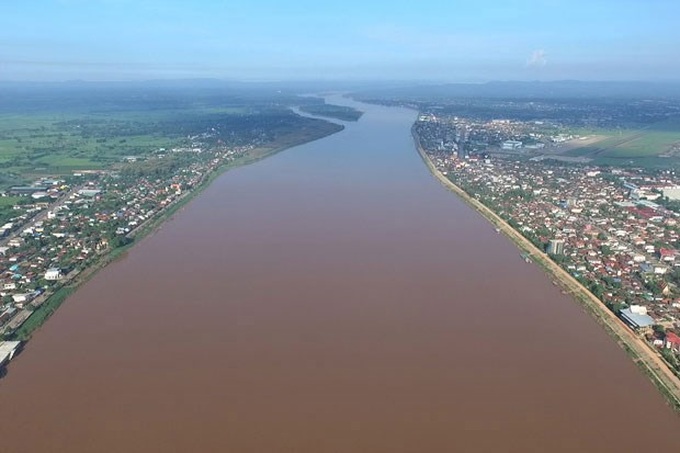A section of Mekong River running through Mekong Delta in Vietnam. The river is getting deeper and deeper. (Source: theguardian.com)
The 250-kilometre-long Tien and 200-km-long Hau, tributaries of the Mekong, are two major rivers in the delta, which is the country’s largest rice, fruit and seafood producer.Hoang Van Hung, head of the Vietnam Inland Waterways Administration South Branch, said their depth has been increasing faster since 2008, now at an average of three to seven metres.
The situation is occurring along their entire lengths, he was quoted as saying in Tuoi Tre (Youth) newspaper.
Nguyen Huu Thien, an ecologist based in the delta, attributed the deepening to excessive sand mining and the impacts of hydropower dams upstream.
Hydropower dams along the Mekong in China have caused a 50 percent reduction in fine grained sediments in the delta, he said.
Delta provinces are exploiting the Mekong uncontrollably, he added.
Le Manh Hung, deputy head of the Department of Irrigation, said in 2013 he presided over a research project on the impact of sand mining on the Tien and Hau rivers.
The delta provinces’ zoning plans for sand mining have not considered whether the mining could cause erosion of the river bed while mining process is not appropriate and does not safeguard river banks and beds from erosion, he said.
Besides, the provinces only estimate the reserves of sand and grant licences without evaluating the volume of sediments washed from upstream areas, he said.
“With the current mining volume, the delta will mine all sand reserves in the Tien and Hau rivers in less than 30 years.”
Huynh Yen Van, deputy head of the Ben Tre Province Natural Resources and Environment Department’s Hydro-meteorology and Marine Resources Division, said a recent department study found that silt build-up in the Tien, Ham Luong and Co Chien rivers is very slow and even absent in some places.
While silt deposits normally recover over a period of time, it is not happening now as a result, she said.
In Ben Tre, the provincial Fatherland Front earlier this month informed the People’s Council that the public opposed a plan to dredge a passage in the Tien River in Cho Lach and Chau Thanh districts.
The Tien Giang Province People’s Committee has stopped issuing licences to mine sand in the Tien to ensure the river bed and banks are not eroded.
However, three companies have been licensed by the Ministry of Transport to dredge a stretch of the river from its mouth to Dong Thap province.
Earlier this month Tien Giang petitioned the ministry to stop existing sand mining projects and not grant any new licences.
The Dong Thap People’s Committee has also petitioned the ministry not to dredge a passage in Chau Thanh district’s An Hiep commune and Cao Lanh district’s Binh Thanh commune.
Dinh Cong San, deputy director of the Southern Institute of Water Resources Research’s Centre of River Training and Natural Disaster Mitigation, said some provinces in the delta have stopped issuing licences to mine sand.
The Government should study and identify areas where sand can be mined while also ensuring easier transportation there, he said.
San said a major programme that would cost 1 million EUR and be funded by the EU would study erosion in the delta’s coastal areas.
All issues such as the impact of less silt carried down the Mekong to the delta, sand mining, climate change and rise in seawater levels would be evaluated, he said.
“Based on the evaluation results, sustainable solutions will be found.”

